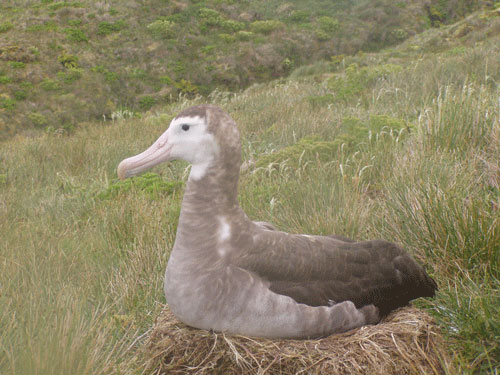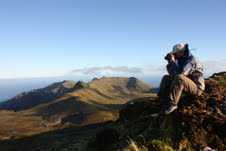In what is practically their only breeding site in the world, a census of incubating Tristan Albatrosses Diomedea dabbenena was recently conducted as part of Gough Island's long-term population monitoring project. Gough, situated in the South Atlantic, is part of the United Kingdom Overseas Territory of St Helena, Ascension and Tristan da Cunha. Gough is a nature reserve of Tristan da Cunha, a Ramsar International Wetland and forms part of a World Heritage Site.

The Critically Endangered Tristan Albatross is the most genetically distinct of the five wandering albatross species (Nunn & Stanley 1998) and is thought to be the third rarest albatross (Cuthbert et al. 2004). As with all southern hemisphere albatrosses, Tristan Albatrosses are killed as bycatch by Southern Ocean long-line fisheries (Ryan et al. 2001). Compounding the problem, breeding success is only around 27% (Cuthbert et al. 2004) and can drop as low as 19% some years (unpubl. data), mainly because each winter a large proportion of the chicks are attacked and killed by introduced House Mice Mus musculus (Wanless et al. 2007).
Complete-island censuses of incubating Tristan Albatrosses were first conducted in 1956 (Swales 1965) and yearly incubator counts have been possible since 2004. The round-island census involves scan counts from designated vantage points, corrected using ground-counts of staked nests in two study colonies. Although scans can be completed in three to four days, the notoriously unpredictable mountain weather frequently extends this to up to 10 days even in summer. During this year's count we spent as much time retreating to the tent in howling fog as actually doing the count itself.

The 2010 count yielded a total of 1698 incubating Tristan Albatross pairs. Although this is slightly lower than the last two years' counts (1760-1800 pairs), incubator numbers have increased from a low period during 2005-2007 (1200-1400 pairs).
Since mid-March, Gough's Tristan Albatross eggs have started hatching. Another round-island count in September will determine how many of the chicks have survived attacks by mice this winter.
Search on ‘Gough' for earlier news items on the island and its ACAP-listed seabirds.
Acknowledgements
This work would not have been possible without the many field workers who have undertaken and helped with counts over the years. The study was conducted by the Royal Society for the Protection of Birds (RSPB) and the Percy FitzPatrick Institute, University of Cape Town, with the logistic support of the South African Department of Environmental Affairs and the approval of the Tristan Conservation Department. Funding has come from the Agreement on the Conservation of Albatrosses and Petrels (ACAP), Birds Australia, the International Association of Antarctica Tour Operators (IAATO), the RSPB, and the UK's Overseas Territories Environment Programme (OTEP).
References
Cuthbert, R., Sommer, E., Ryan, P.G., Cooper, J. & Hilton, G. 2004. Demography and conservation of the Tristan Albatross Diomedea [exulans] dabbenena. Biological Conservation 117:471-481.
Nunn, G.B. & Stanley, S.E. 1998. Body size effects and rates of cytochrome b evolution in tube-nosed seabirds. Molecular Biology Evolution 15: 1360-1371.
Ryan, P.G., Cooper, J. & Glass, J.P. 2001. Population status, breeding biology and conservation of the Tristan Albatross Diomedea [exulans] dabbenena. Bird Conservation International 11: 33-46.
Swales, M.K. 1965. The seabirds of Gough Island. Ibis 107: 17-42.
Wanless, R.M., Angel, A., Cuthbert, R.J., Hilton, G.M. & Ryan, P.G. 2007. Can predation by invasive mice drive seabird extinctions? Biology Letters 3: 241-244.
Kalinka Rexer-Huber & Graham Parker, Royal Society for the Protection of Birds, 31 March 2010

 English
English  Français
Français  Español
Español